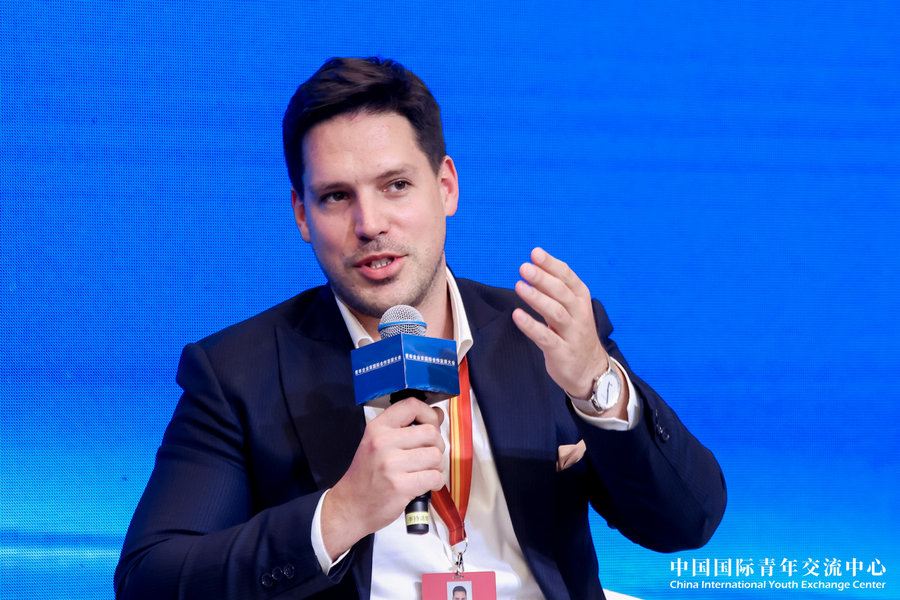Nurturing Entrepreneurial Collaboration between Montenegro and China

Uroš Bulatović has enjoyed a diverse career path ranging from jockey to a husbandry engineer, and now the president of the Union of Young Entrepreneurs of Montenegro. Despite the vast differences between these roles, he has used networking and learning from the best to excel in both sports and industry. He believes that a strong sense of community can empower young people to achieve higher levels of success than previous generations by giving them the ability to leverage the knowledge and experiences of people of different ages.
Upon realizing that young people in Montenegro were generating numerous innovative ideas with global potential but facing constraints due to the size of the economy and limited access to venture capital, Bulatović founded the Union of Young Entrepreneurs six years ago, and since then, he has worked to make the organization a credible partner on infrastructure, projects, communications, and networks. “We are ready to enhance organizational capacities to maximize collaboration opportunities with China and the world, and we hope to open more doors for young entrepreneurs to expand their global reach.”

The International Cooperation and Development Conference for Young Entrepreneurs held in Beijing in April provided a platform for business leaders, heads of economic organizations, and representatives of young entrepreneurs to further explore such business possibilities. Bulatović found Chinese entrepreneurs resourceful and open to collaboration. “Both sides need to find a way to understand and leverage each other’s market, and it’s the union’s job to facilitate opportunities for young people to meet face to face and create new and innovative partnerships.” The conference also brought the establishment of the International Alliance of Young Entrepreneurs Associations, with Bulatović’s union as a founding member. The union aims to support young entrepreneurs by offering essential services such as information, consultancy, education, connections, training, mentorship, and financial support if necessary, to create a more sustainable ecosystem and encourage more people to engage in entrepreneurship. Bulatović highlighted the opportunities the alliance offers to businessmen to get directly involved and noted that all members share responsibility to create a dynamic and sustainable community for young entrepreneurs.
“Young people in Montenegro and the Balkan region are fully aware of China’s strength as a big market and see huge potential for collaboration.” According to Bulatović, Montenegro lacks a strong manufacturing sector, limiting its ability to produce highly demanded products domestically or worldwide, while China is a world leader in manufacturing. “Collaboration between Montenegro and China in the digital economy, startup businesses, innovation, social entrepreneurship, and the green economy shows great potential because these industries are scalable and can target worldwide markets.”

In 2022, trade between China and Montenegro reached a record high of about US$270 million, according to China Customs. “We hope to increase exports from Montenegro to China this year,” Bulatović said. “Trade between our two countries has been successful for several years, but we need to accelerate it and provide young people with opportunities to showcase their capabilities.” He noted the strategic location of Montenegro makes it an ideal destination for various industries connecting China and Central and Eastern European countries (CEEC), so both sides should explore the potential.
Recent years have brought stronger cooperation between Montenegro and China, especially in terms of infrastructure. However, Montenegro’s Bar-Boljare Highway, a key project under the Belt and Road Initiative and the China-CEEC cooperation mechanism, was smeared by some Western media outlets as a “debt trap.” According to Bulatović, after almost a year since the first phase opened, local people are already reaping the project’s promised benefits such as increased tourists and improved logistics. “This project demonstrates Montenegro can undertake major initiatives and invest in infrastructure to become more attractive and connected to the Balkan region, Europe, and the world,” he explained. “Big projects take years to complete. Rather than prematurely assessing its success, we should wait for the results to speak for themselves.”
Bulatović is confident in business cooperation with China, and he has heard many Chinese businesspeople express interest in collaborating with Montenegro on real estate, investment, and tourism. To encourage young people from both countries to turn innovative ideas into products, Bulatović’s team plans to establish a prototyping center in China. This center will enable young entrepreneurs to test their ideas in Montenegro’s market and collaborate with their Chinese counterparts to expand into larger markets in China and beyond. “We plan to showcase successful collaboration stories to young people in both countries to demonstrate how collaboration can work in practice. Our ultimate objective is to inspire and spark a desire for collaboration among young people in China and Montenegro.”
